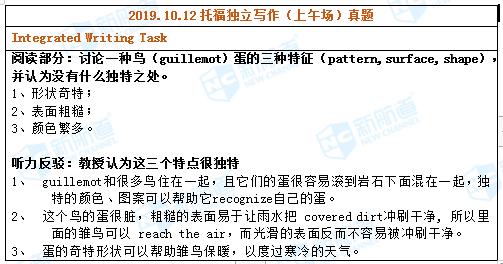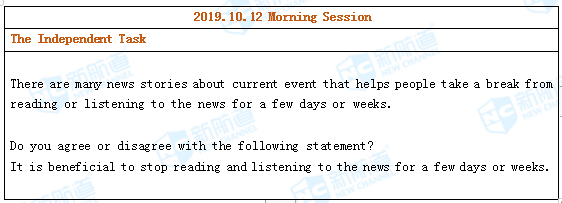
2019年10月12日托福写作考情分析 - 黄盛
作者:武汉新航道北美考试院 托福写作组 黄盛

本场托福综合写作考试,仍然是有关动植物的高频主题,有多道TPO题目都涉及相关考点:TPO10、15、17、18、21、23、42、48等,都和本期考题有相似之处。因此,TPO仍然是考生备战综合写作的重要资料。
可以类比下列这道TPO的综合写作。
TPO42Birds Hitting Glass
阅读部分:
总观点:有三种方法可以防止鸟类因为撞到玻璃而受伤:
• 设置单向玻璃(one-way glass);
• 在窗户上画彩色图案,如条纹等(colorful patterns/strips);
• 用磁场(magnetic field)引导鸟飞行的方向。
听力反驳:
这三个方法都没有办法有效阻止鸟类受伤。
• 单向玻璃像镜子一样,鸟类无法分辨镜子里的景象和真实的景象,仍然会撞到玻璃;
• 条纹太窄,鸟类会认为有个可以穿过的洞;条纹太宽,影响房间内的采光;
• 鸟类只有在远距离迁徙时,才需要用到磁场。在城市内部飞行时,不需要用磁场。

题目解析:
10月12日的题目是一道A/D类statement的题型,题目长度虽然不长,但是暗含很多审题陷阱需要注意。考生需要注意独立写作题里给出的所有信息,因为这些背景信息往往限定了分论点的构思方向。本考题的背景知识提供了news story的相关信息,阐述了目前是存在news story这种总结性的报道用来一次性回顾某个时间段内关于的所有新闻。所以本考题需要论述的重点并不在于“停止读新闻有没有好处”而是“在某段时间内停止读新闻,然后再重新读新闻有没有好处”,强调了停止阅读新闻的这个行为是“暂时性的”,在这种情况下有没有好处,题目主干部分也强调了“for a few days or weeks”。常见的构思误区列举如下:
首先个构思误区是忽略题意中暗含的“暂时性”,直接阐述停止阅读新闻有何好处或者坏处。
e.g. 同意观点:传统的新闻获取渠道在现代社会不够方便有效率,而且即使不这样,人们每天也还是可以通过社交(网络何现实)获取实时信息新闻。(来源:TD北美留学进化论考情分析)
这个分论点完全忽略了“for a few days or weeks”的限制条件,而且只论述了传统新闻获取渠道的坏处,而不是论述“停止阅读新闻“能带来的好处,属于典型的顾左右而言他,完全跑题分论点。
第二个构思误区是忽略或者完全淡化“新闻”本身这个限制条件,只谈论可以把停止阅读新闻获得的额外时间用来做别的事情,所以可以带来好处。
e.g. 同意观点:我们可以利用这段时间去做我们自己想做的事情,所以我们能够得到更好放松,让我们能更有效率地投入到工作当中
这个分论点直接跳过了对news本身的论述,套用“空余时间”能够带来什么好处的泛用分论点。
简而言之,构思重点是需要突出“经常性阅读新闻”和“暂时性停止阅读新闻”之间的差异进行论述。下面提供两个分论点构思思路:
1.就事论事的角度,直接阐述间歇性地停止阅读新闻,是对阅读新闻这个行为本身有好处的。
e.g. 目前关于一件事情的新闻报道往往鱼龙混杂,真假难辨,关注实时的新闻往往会导致读者被虚假信息或者谣言误导。同时,关于一件事的新闻报道会在一段时间内进行自发性的筛选,进而淘汰掉虚假信息,所以如果主动空出一段时间不阅读新闻,来让所有新闻进行一个自发性的筛选,是能够保证接触的到的新闻信息的真实性的。
2.以时间为出发点,通过对比的手法,阐述时刻关注新闻的坏处,列举把时间花在其他方面更有意义。
e.g. 新闻内容是关于世界各地各方面的信息,往往和普通人的现实生活关系不大,过度关注这些遥远的信息,是会让人们忽略自己生活本身的意义。暂时性的停止阅读新闻,能够让人们重新关注自己生活相关的方面。
Issues related to news report have never failed to attract people’s attention. With the significant changes in social media, the quantity of news that can be accessed by individual readers explodes. As a result, a heated debate topic arose among the public recently: whether a period lasting for a couple of days or weeks free from news brings about benefits or not. Some contend that it is advantageous to keep up with news report every day. However, as far as I am concerned, temporarily getting rid of new generates positive consequences. My points can be illustrated as below.
Firstly, a blank session without news leaves a time window to filter news to be read, which can help readers understand the topic or event more precisely. To be specific, currently, social medias creating numerous news on every topic or event, the authenticity or reliability of the news are not guaranteed. Therefore, acknowledging every piece of news may lead readers’ attitude astray, which is hard to be restored due to inertial thinking. Meanwhile, as the time goes by, every piece of the news in the public will be gradually testified by further investigation, inducing the elimination of news that is proven to contain imprecise information. In other words, there exists a time window for the considerable amount of news to be filtered, leaving behind only testified ones. Consequently, a blank session without reading news fitting in this time window frees readers from unauthentic information that may impair the accuracy to form an understanding about the event or topic. For example, 2010 witnessed a notorious case in my city. At the very beginning, the suspect was accused of violently assaulting innocent citizen, which was reported by all the newspapers at that time. As expected, everyone who had read the news was blaming the suspect, and the situation escalated when newspapers published a photo of the exact second when the suspect was punching the victim. However, the victim was then discovered to be an infamous thief who had already committed theft for dozens of time, and the suspect was aiming to catch him while the photo was proven to be artificial. Clearly, if news readers had accessed the news after all the information are filtered, such misunderstanding would have never occurred.
On top of that, regularly staying away from news positively affect individual’s life. Indeed, news conveys information of events happening all over the world, which forms an essential bridge between world and individuals. However, most of news are geographically or mentally far from readers’ daily life, so that sticking to news every day possibly causes readers pay less attention to the environment they live in or even affects readers’ attitude towards their life. Needless to mention, Individual’s daily life depends mostly on things and people around them which deserves much more concerns in order to lead a positive life. Therefore, temporarily staying away from news provides space for individuals to draw their attention back to the things and people within their reach, which can remind them the real meaningful points in their life. Meanwhile, the news stories can compensate for the missing news by providing a conclusive report afterwards. For instance, my cousin’s high school years was full of pain and sorrow. During that time, he was addicted to news related to politics between nations all over the world, which were always about conflicts and strife. He was so in to it that he neglected or distrusted the friendship or even relationships with his family members, which generated countless arguments and barriers in his life. After high school graduation, he decided to cut off the time on reading political news, and to focus more on social interactions. Eventually, he managed to mend the relationships with the people who cared for him and his life was back to normal yet harmonious.
Admittedly, news usually focuses the effect of time so that skipping news for a period may cause the delivery of some important information delayed. Nevertheless, such delay usually does not affect much to readers while it can in turn guarantees the authenticity. Furthermore, reducing the portion of time spent on news leads people care more about their own daily life. Judging from all above, I firmly agree that regularly taking breaks from reading news induces positive effects to people.